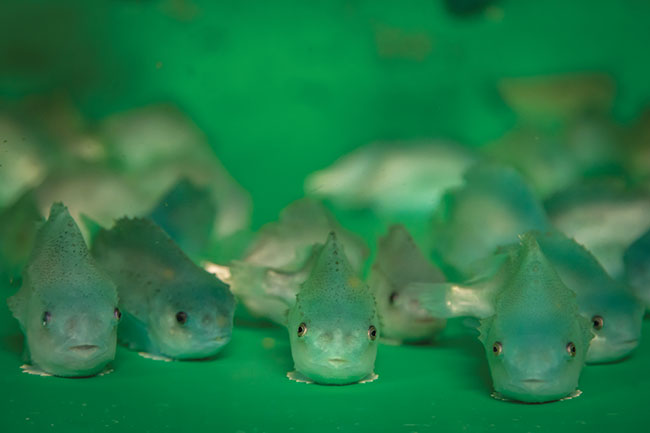
Bold or Shy: Study examines lumpfish ‘personality’
April 12, 2021
By
Liza Mayer
Tests will determine if certain traits affect the species’ efficiency as cleaner fish
 Lumpfish are a biological weapon against sea lice, but certain traits could affect their efficiency, say DFO researchers
Photo: ©Adam / Adobe Stock
Lumpfish are a biological weapon against sea lice, but certain traits could affect their efficiency, say DFO researchers
Photo: ©Adam / Adobe Stock Is personality a factor in the efficiency of lumpfish as a cleaner fish?
This is a question that Canadian researchers aim to address after observing that some lumpfish (Cyclopterus lumpus) aggressively preyed on salmon lice, while others preferred the salmon feed, or graze on the pens.
Researchers at Fisheries and Oceans Canada’s (DFO) St. Andrew’s Biological Station say that “shy” lumpfish means salmon farmers would need to employ more of them in order to effectively reduce sea lice. However, this will result in increased costs for the industry and risks to the wild lumpfish population.
They also want to find out if behaviours – shyness or aggressiveness – are inherited and, if so, could they be used as the basis for a breeding program?
The researchers, in collaboration with Cooke Aquaculture, will conduct behavioural tests to assess the individual bold-shyness and social traits and aggression of lumpfish.
“This is a novel approach to study individual behaviour and personality of the lumpfish. We are hoping to determine if there are linkages to personality and their efficiency as a cleaner fish,” said DFO biologist Steve Leadbeater.
Behavioral tests
Working closely with postdoctoral fellow Benjamin Whittaker and project partners at the University of Guelph, the group is working to profile lumpfish personality, using behavioural tests widely used on different species of fish.
For the bold-shyness test, each fish is exposed to a novel object such as a plastic brick or a golf ball in an individual tank. Those that interact more frequently with the object are deemed to have a bolder and a more curious personality than individuals avoiding novel objects.
A mirror test will be used to assess individual social behaviour and aggression. Individuals avoiding their mirror reflection are deemed less social and those visiting their reflection are deemed more social, with incidents of biting behaviour deemed as aggressive.
Personality profiling will be filmed using overhead closed-circuit TV cameras, and each fish will be tested twice to evaluate the repetitiveness of the behaviour. The lumpfish will then be grouped into tanks depending on their personality types.
The researchers said data collected in the study could be used in future studies to examine the genetic makeup of various personality profiles of cleaner fish and if these traits are inheritable.
Feeding behaviour
The study will then look at the relationship between the lumpfish personality and its success in reducing sea lice load on a salmon host. Lumpfish will be paired with a salmon carrying sea lice, and observed to confirm if the lumpfish consumes lice. This observation will add confidence to the personality assignments.
The study will also look at whether certain traits in the salmon, such as whether they have co-operative behaviour that facilitates lice removal by cleaner fish, play a role in the lumpfish feeding efficiency. If some families of salmon show more acceptance of cleaning behaviour by lumpfish, can this trait also be used for breeding selection of Atlantic salmon? Groups of lumpfish with personalities expected to be good cleaners, and lice infected salmon, will be placed together in a tank to allow the fish to engage in cleaning behaviours for a period of time. Following this, the average lice load will be assessed to examine the interaction of lumpfish and salmon client.





